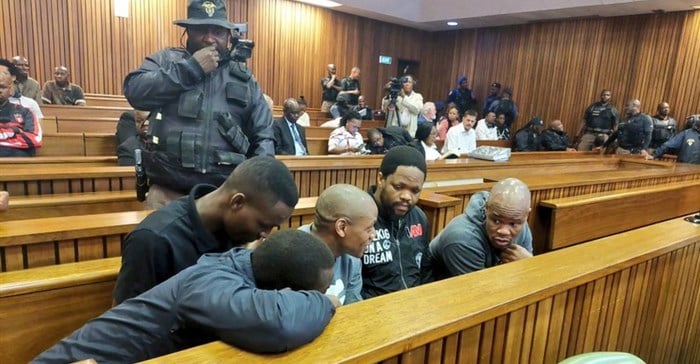Following the actions of some local journalists at the Senzo Meyiwa murder trial, which is of huge public interest, the trial proceedings will not be broadcast live.

Source: ©
The Citizen The Citizen The hounding of a state witness by three media houses has led to the baning of the live broadcasting of the Senzo Meyiwa murder trial
This follows three media houses, SABC, eNCA and Newzroom Afrika pursuing and trying to corner state witness, Tumela Madlala as he came into court.
Eyewitness News (EWN) reports that the journalists have been banned from court.
“The presiding judge in the Pretoria High Court has lambasted a group of journalists at the Senzo Meyiwa murder trial for attempting to interview a State witness before court proceedings started,” says EWN.
The article quotes that Judge Maumela ruled that the behaviour of the journalists could not go without consequence.
"The media has to toe the line and it has to toe a line it knows already, there's nothing new here, this is not the first time to plead in the court and those misdemeanours are committed from a situation of knowing very well what the rules are," says Maumela.
He adds that the media should not be above the law and especially if it affects people coming to give testimony.
Media houses apologise
State advocate, George Baloyi, told the court that the incident had left Madlala petrified and unsettled.
"Intrusive and overbearing conduct by members of media against witnesses is a cause for serious concern, my lord," Baloyi says.
He adds: “While we support the coverage from the media, events from this morning are unacceptable."
According to the The Citizen Baloyi says that the three media houses have apologised “for their reprehensible behaviour”.
Journalists not above the law
In reaction to the incident, the South African National Editors’ Forum (Sanef) has reiterated that journalists are not above the law and are also not beyond criticism.
“The journalists overstepped the line and as such, we appreciate the apologies from the media houses involved. We also commend the journalists involved for apologising and recognising the error of their ways,” says Sanef in a media statement.
While it says that the actions of the journalists were uncalled for, it adds that the immediate reaction to ban them from the court proceedings is unfortunate as it means that most television viewers’ privilege of watching the live proceedings was taken away from them.
A duty to care
“Our newsrooms must always be reminded that they have a duty to care about how they treat stories and the subjects of their reporting,” says Sanef.
The Forum encourages journalists to familiarise themselves with court proceedings and how to behave when it comes to witnesses - more importantly, the implications of their behaviour.
“Sanef has put together an exhaustive court manual that is meant to assist editors, news editors, and ultimately, journalists who cover court matters,” it adds.
“The journalists overstepped the line and as such, we appreciate the apologies from the media houses involved. We also commend the journalists involved for apologising and recognising the error of their ways.”





























![Today, Halo and Demographica announce a new specialist agency, Second Rodeo]], headed up by Mike Stopforth (left). Dean Oelschig, managing partner and founder of Halo (right) says they will work as a group but ultimately, each agency will be an individual specialist](https://biz-file.com/c/2505/772543-64x64.jpg?2)





